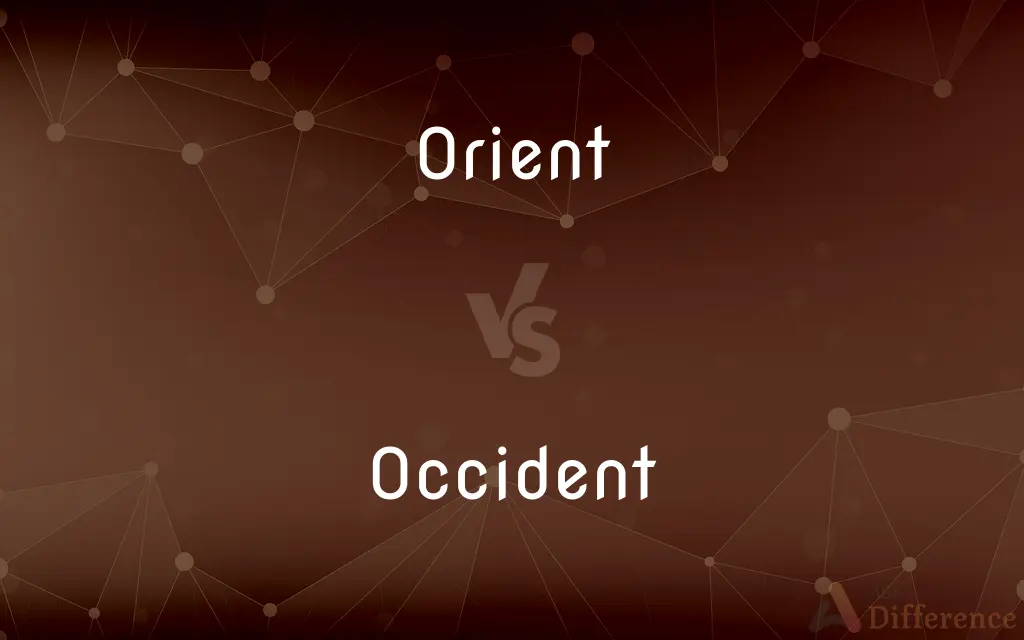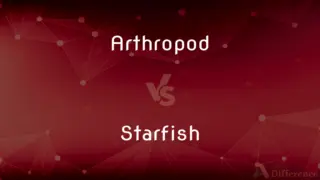Orient vs. Occident — What's the Difference?
By Maham Liaqat & Fiza Rafique — Updated on March 27, 2024
Orient refers to regions of the East, traditionally Asia, while Occident denotes the West, primarily Europe and the Americas.

Difference Between Orient and Occident
Table of Contents
ADVERTISEMENT
Key Differences
The term "Orient" historically designated the Eastern world, particularly Asia, characterized by diverse cultures, languages, and ancient civilizations such as China, India, and the Middle East. Conversely, the "Occident" refers to the Western world, including Europe and later the Americas, known for its own unique historical, cultural, and political developments. These terms stem from a Eurocentric perspective, where the "Orient" was seen as exotic and mysterious, in contrast to the familiar and rational "Occident."
The Orient has been associated with ancient traditions, rich artistic expressions, and varied religious practices, including Buddhism, Hinduism, and Islam. The Occident, on the other hand, is often linked to the rise of democracy, scientific advancement, and Christianity. These broad generalizations have fueled stereotypes and simplifications in the past, overlooking the complexities and individualities of each region.
The Orient has historically been celebrated for the Silk Road, spices, and technological inventions such as paper and gunpowder, which significantly influenced global trade and culture. The Occident's economic narrative includes the Industrial Revolution, colonization, and technological innovation, shaping the modern world economy and international relations.
In literature and art, the Orient has inspired a genre known as Orientalism, where Western artists and writers depicted their interpretations of the East, often romanticized and skewed. In contrast, Occidental art and literature have focused on themes of progress, reason, and individualism, reflecting the values and philosophies of the Enlightenment and beyond.
The concept of orienting oneself, derived from facing the sunrise or east, metaphorically suggests the way cultures view and understand themselves in relation to others. The juxtaposition of Orient and Occident thus not only highlights geographical distinctions but also reflects deeper perceptions and biases that have influenced cross-cultural interactions throughout history.
ADVERTISEMENT
Comparison Chart
Definition
Regions of the East, mainly Asia
The Western world, primarily Europe and the Americas
Cultural Characteristics
Ancient traditions, diverse religions
Democracy, scientific progress
Economic Contributions
Silk Road, spices, inventions
Industrial Revolution, technological innovation
Literary and Artistic Expression
Orientalism, exotic and mystical themes
Themes of progress, reason, individualism
Historical Perspective
Seen as exotic and mysterious from a Eurocentric view
Considered the standard of rationality and progress
Compare with Definitions
Orient
Ancient Civilizations.
The civilizations of the Orient have contributed significantly to human knowledge and progress.
Occident
Industrial Revolution.
The Industrial Revolution began in the Occident, revolutionizing production and society.
Orient
Cultural Richness.
Oriental music and art are celebrated for their complexity and beauty.
Occident
Democratic Ideals.
Concepts of democracy and governance have deeply influenced Occidental political systems.
Orient
Religious Diversity.
The Orient is the birthplace of religions such as Hinduism, Buddhism, and Islam.
Occident
Christianity.
Christianity, predominant in the Occident, has played a significant role in shaping Western culture and values.
Orient
Eastern Regions.
The Orient includes countries like China, India, and Japan, each with its unique culture and history.
Occident
Western Regions.
The Occident is characterized by countries in Europe and the Americas, shaping much of modern history.
Orient
Silk Road.
The Silk Road was a critical trade route that connected the Orient with the Occident.
Occident
Scientific Advancement.
The Scientific Revolution, originating in the Occident, transformed our understanding of the world.
Orient
A pearl having exceptional luster.
Occident
Western lands or regions; the west.
Orient
The Orient is a term for the East, traditionally comprising anything that belongs to the Eastern world, in relation to Europe. It is the antonym of Occident, the Western World.
Occident
Occident The countries of Europe and the Western Hemisphere.
Orient
Orient The countries of Asia, especially of eastern Asia.
Occident
The part of the horizon where the sun last appears in the evening; that part of the earth towards the sunset; the west.
Orient
The luster characteristic of a pearl of high quality.
Occident
The Western world; the part of the world excluding Asia
Orient
(Archaic) The place on the horizon where the sun rises; the east.
Occident
The part of the horizon where the sun last appears in the evening; that part of the earth towards the sunset; the west; - opposed to orient. Specifically, in former times, Europe as opposed to Asia; now, also, the Western hemisphere.
I may wander from east to occident.
Orient
Having exceptional luster
Orient gemstones.
Occident
The countries of (originally) Europe and (now including) North and South America
Orient
(Archaic) Eastern; oriental.
Occident
The hemisphere that includes North and South America
Orient
To align or position in a particular direction or in a particular relation to the points of the compass
Orient the swimming pool north and south.
Oriented the telescope toward the moon.
Orient
To build (a church) with the nave laid out in an east-west direction and the main altar usually at the eastern end.
Orient
To determine the bearings of (oneself); cause (one) to know one's position in relation to the surroundings
Oriented himself by the neon sign on top of the building.
Orient
To make familiar with a new situation
Events to help students get oriented to life on campus.
Orient
To provide with a primary purpose or focus of attention
A medical system that is oriented toward the prevention of disease.
Orient
Usually preceded by the: Orient
Orient
The part of the horizon where the sun first appears in the morning; the east.
Orient
(obsolete) A pearl originating from the Indian region, reputed to be of great brilliance; (by extension) any pearl of particular beauty and value.
Orient
(by extension) The brilliance or colour of a high-quality pearl.
Orient
Rising, like the morning sun.
Orient
Of the colour of the sky at daybreak; bright in colour, from red to yellow.
Orient red
Orient
Of, facing, or located in the east; eastern, oriental.
Orient
Of a pearl or other gem: of great brilliance and value; (by extension) bright, lustrous.
Orient
(transitive) To build or place (something) so as to face eastward.
Orient
To align or place (a person or object) so that his, her, or its east side, north side, etc., is positioned toward the corresponding points of the compass; to rotate (a map attached to a plane table) until the line of direction between any two of its points is parallel to the corresponding direction in nature.
Orient
(transitive) To direct towards or point at a particular direction.
The workers oriented all the signs to face the road.
Orient
To determine which direction one is facing.
Let me just orient myself and we can be on our way.
Orient
To familiarize (oneself or someone) with a circumstance or situation.
Give him time to orient himself within the new hierarchy.
Orient
To set the focus of (something) so as to appeal or relate to a certain group.
We will orient our campaign to the youth who are often disinterested.
Orient
(intransitive) To change direction to face a certain way.
Orient
Rising, as the sun.
Moon, that now meet'st the orient sun.
Orient
Eastern; oriental.
Orient
Bright; lustrous; superior; pure; perfect; pellucid; - used of gems and also figuratively, because the most perfect jewels are found in the East.
Orient
The part of the horizon where the sun first appears in the morning; the east.
[Morn] came furrowing all the orient into gold.
Orient
The countries of Asia or the East.
Best built city throughout the Orient.
Orient
A pearl of great luster.
Orient
To define the position of, in relation to the orient or east; hence, to ascertain the bearings of.
Orient
To acquaint with new surroundings or a new situation.
Orient
Fig.: To correct or set right by recurring to first principles; to arrange in order; to orientate.
Orient
Same as Orientate, 2.
Orient
To place (a map or chart) so that its east side, north side, etc., lie toward the corresponding parts of the horizon;
Orient
The countries of Asia
Orient
The hemisphere that includes Eurasia and Africa and Australia
Orient
Be oriented;
The weather vane points North
Orient
Determine one's position with reference to another point
Orient
Cause to point;
Orient the house towards the West
Orient
(poetic) eastern;
The orient sun
Common Curiosities
What is the Occident?
The Occident denotes the western part of the world, mainly Europe and the Americas, recognized for its historical development in democracy, science, and industrialization.
Why are the Orient and Occident important in cultural studies?
They are crucial for understanding how historical perceptions and stereotypes have shaped interactions and representations of the East and West, influencing art, literature, and politics.
How did the terms Orient and Occident originate?
These terms originated from a Eurocentric perspective, with "Orient" meaning the east where the sun rises, and "Occident" meaning the west where it sets, reflecting geographical and cultural distinctions.
What is the Orient?
The Orient refers to the eastern part of the world, traditionally encompassing Asia and the Middle East, known for its rich cultural and historical heritage.
Can the concepts of Orient and Occident be considered outdated?
Yes, many scholars argue that these terms are outdated and oversimplify complex cultures, reinforcing stereotypes and a divisive East-West dichotomy.
How have economic roles of the Orient and Occident influenced global history?
The economic exchanges, such as the Silk Road and the Industrial Revolution, have been pivotal in connecting the Orient and Occident, influencing global trade, technology, and cultural exchange.
What are the criticisms of dividing the world into Orient and Occident?
Critics argue that such a division reinforces a simplistic and binary view of the world, overlooking the diversity within regions and the interconnectedness of global cultures.
How do the religious traditions of the Orient and Occident differ?
The Orient is known for religious diversity, including Hinduism, Buddhism, and Islam, whereas Christianity has been a dominant force in the Occident.
What impact did Orientalism have on Western perceptions of the East?
Orientalism, as a Western artistic and literary genre, often romanticized and exoticized the East, impacting Western perceptions and sometimes perpetuating stereotypes.
How does understanding the Orient and Occident contribute to global awareness?
It encourages a deeper appreciation of cultural diversity and historical contexts, challenging stereotypes and promoting a more nuanced understanding of global cultures.
Share Your Discovery

Previous Comparison
Figurine vs. Doll
Next Comparison
Arthropod vs. StarfishAuthor Spotlight
Written by
Maham LiaqatCo-written by
Fiza RafiqueFiza Rafique is a skilled content writer at AskDifference.com, where she meticulously refines and enhances written pieces. Drawing from her vast editorial expertise, Fiza ensures clarity, accuracy, and precision in every article. Passionate about language, she continually seeks to elevate the quality of content for readers worldwide.














































